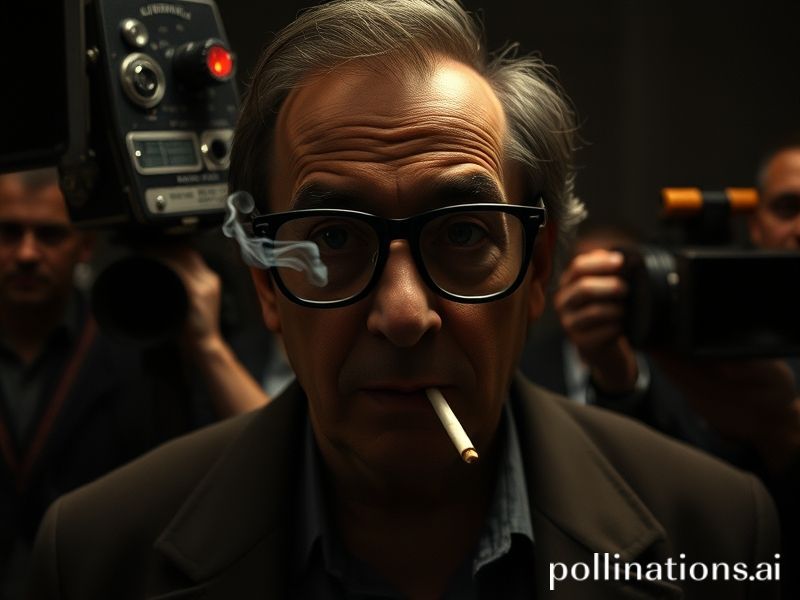Saint Marty of the Cinema: How Martin Scorsese Became the Planet’s Favorite Confessor
Martin Scorsese, the 82-year-old New Yorker who still looks faintly surprised every time he survives another awards season, has become a sort of secular patron saint of global cinephilia. From the neon back-alleys of Tokyo to the crumbling art-deco cinemas of Buenos Aires, his name is whispered with the same reverence once reserved for deities or moderately successful arms dealers. What began as a local boy’s obsession with Italian-American guilt has metastasized into a planetary lingua franca of violence, grace, and the faint smell of mothballs from old 35-millimeter prints.
Consider the Shanghai International Film Festival, where taxi drivers now quote Travis Bickle in Mandarin—badly, but with conviction. Or the multiplex in Lagos where Goodfellas screens at midnight to a roomful of cryptocurrency traders who see Henry Hill’s downfall as a cautionary tale about insufficient diversification. Scorsese’s parables of sin and redemption translate across borders because every society, it turns out, has its own version of men in silk shirts making terrible decisions under poor lighting.
The irony, of course, is that the man himself keeps insisting he’s just a “small personal filmmaker,” a claim roughly as modest as Coca-Cola announcing it’s a humble neighborhood lemonade stand. His latest three-and-a-half-hour meditation on Jesuit guilt (or whatever the editing bay coughs up this month) will debut on every continent except Antarctica, where the penguins have wisely stuck to streaming. Meanwhile, the same global executives who green-light his budgets also green-wash their carbon footprints by planting a sapling somewhere in the Nordics and calling it absolution.
Internationally, Scorsese has become a diplomatic soft-power asset. The French government once awarded him the Légion d’honneur, presumably because guillotining artists went out of fashion. South Korea’s cultural ministry screens Taxi Driver for civil servants to illustrate both urban alienation and the importance of keeping the meter running. Even the Vatican—never a slouch at co-opting pop culture—invited him for a chat, perhaps hoping to negotiate a director’s cut of the Ten Commandments with flashier cinematography.
Yet the planetary embrace carries its own contradictions. Netflix, the algorithmic empire that bankrolled The Irishman, simultaneously compresses the film into thumbnails the size of postage stamps, ensuring that De Niro’s de-aged eyes stare into viewers from Jakarta to Reykjavik with the same uncanny plastic sheen. The result is a shared hallucination: millions of strangers binge-watching a 209-minute elegy for American masculinity while doom-scrolling on their phones. Somewhere, Scorsese winces; somewhere else, the algorithm registers a 0.3% uptick in engagement and orders another limited series about wise guys with cholesterol issues.
Meanwhile, the man keeps circling the globe like a friar collecting indulgences, restoring obscure Senegalese films or rescuing a decaying print from a flooded basement in Manila. His World Cinema Project is basically cinematic Médecins Sans Frontières, except the patients are reels of nitrate and the prescriptions involve grant money and prayer. Every time he saves a forgotten classic from vinegar syndrome, another streaming service quietly deletes a hundred older titles to make server space for true-crime docuseries narrated by B-list actors.
And so we arrive at the final, cosmic joke: Scorsese, the chronicler of American excess, has become the very embodiment of cultural globalization—an ambassador for an art form that’s simultaneously everywhere and nowhere. His films screen in 4K on transatlantic flights while the passengers ignore them for Sudoku. They’re quoted in Tarantino-themed karaoke bars in Seoul and dissected in graduate seminars in São Paulo, all converging on the same existential shrug: we are all, in the end, just another tracking shot through a nightclub we can’t afford.
In the grand casino of international reputation, Scorsese keeps rolling sevens. The house pretends it can still lose; the audience pretends it’s still surprised. And somewhere in the edit suite, the man himself keeps cutting closer to the bone, because the alternative—silence—is the one thing the world refuses to stream.







